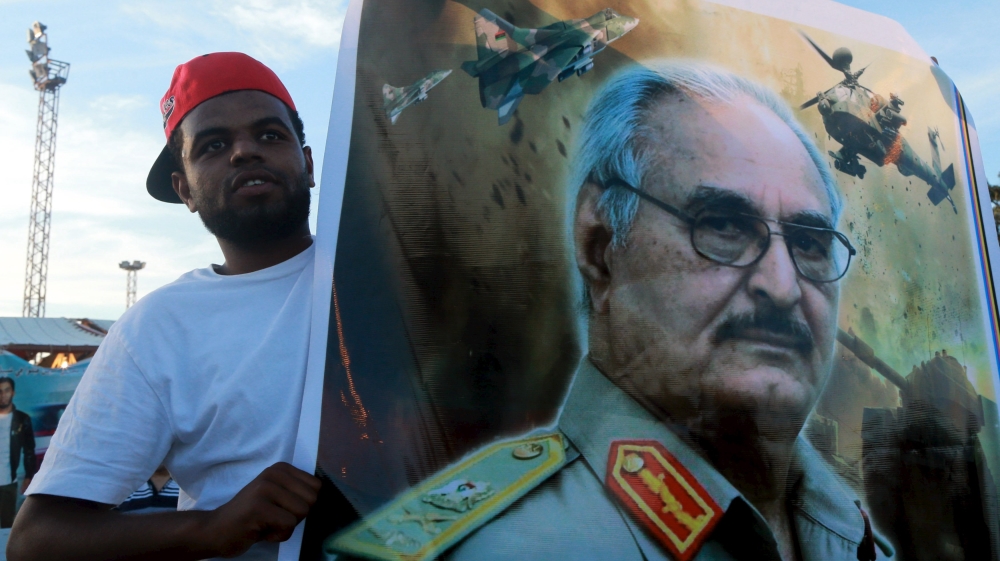Tripoli- No one can know whether the ongoing major military operations in Libya aim at eradicating hundreds of heavily-armed militias according to a proactive plan or whether the developments and repercussions of clashes have just changed the locations of these militias.
These questions arose while the Presidential Congress led by the internationally-supported Fayez el-Sarraj has been seeking to impose power to control the country and the capital drowned in chaos. Amid weak agreement opportunities between Sarraj and Khalifa Haftar, military commander of Libya’s eastern government, there are attempts to form a semi-national force to replace militias, which moved to Tripoli after the defeats they faced in the eastern and southern region against Haftar forces.
The two-government fact in the country foreshadows more clashes among militias, which prepares to fight each other after they allied in the past to fight Haftar.
Three major militias currently control the Libyan scene, with each of them having its own small intelligence body, prison, prisoners and commit horrible crimes. Acts of torture were also reported as part of the competition held to control the capital.
It is worth noting that the majority of Libyan cities have kept military councils, which were formed during the revolution against Muammar Gaddafi. Each one of these councils, mainly in the capital and its surrounding cities, makes all efforts to attract militias and strengthen its forces. The militia member’s salary starts with USD300 and may double if he is an excellent sniper. The biggest share of financial allocations are funded from the state’s treasury.
The second type of militias are sectarian groups which have their private allegations on applying the Islamic Shariaa and the establishment of a religious state, with some of them cooperating with ISIS like Al-Farouq Faction in Misrata. This type of militias receives funds from mysterious external sources.
The third type is known as mercenaries led by human and arms traffickers who bring militants and weapons from Asian and African countries to sell them as commodities for other militias that pay huge sums.
Since the fall of Gaddafi in 2011, the NATO-backed rebellions and militants inherited the camps and arms of the Libyan army. But, major figures like dissidents from the army, police, and intelligence were playing major roles in the cities’ military councils.
A report shows that the Libyans’ reluctance to join armed militias or participate in their wars led to the expansion of militant’s export from neighboring countries over the two past years to join all the militias existing in the Libyan scene, even those backed by ISIS.
According to Libyan Parliament Member Ismail al-Ghoul al-Sharif said that the Jafra region comprised the biggest weapon stores during Gaddafi’s rule. However, all these stores were completely evacuated after they were full of tanks, armors, missiles, and ammunitions. This armory was captured by the militias and thieves sold huge quantities of them to neighboring countries asking for arms mainly in Africa.
After controlling the state’s institutions, leaders of extremist militias imported thousands of tons of developed arms and spying systems; figures show that militias possess around 20 million pieces of arms.
Militias were also empowered by capturing the security and intelligence archive in Tripoli, sharing control on ports, airports, and army training camps, which expanded illegal migration activities, acts of killing, steeling, and kidnapping.
Analyst Rajab bin Ghazzi said that amid these circumstances, people have suffered from lack of services; however, following the withdrawal of the majority of these militias, the future of Tripoli became ambiguous and more complicated.
*Dispute on the reconstruction of the Tripoli International Airport
One of the major militia leaders has been putting pressures on the Presidential Congress to agree on a transaction he wants to make for one of his Turkish friends to reconstruct the airport.
On Saturday, another competing militia prevented investors from entering the airport, while another one attacked the central bank to prevent it from allocating the needed funds for the reconstruction.
*Cooperation, fighting, then re-cooperation
It is hard to maintain a stable status of cooperation or fighting among militias. Generally, during the wars launched against ISIS, some militia members refused to follow commands, which caused the death of many young men. Militias were suddenly withdrawing leaving their alliances without any support.
*Militias to steel oil
In November, one militia stole around five million liters of oil from the refinery located in a city near Tripoli. In another accident, militias used heavy arms to oblige around 100 truck loading around 50,000 of oil to direct toward the marine port where they completed a transaction with two oil merchants. Yet, security authorities intend to open an investigation in oil steeling accidents in the country.
